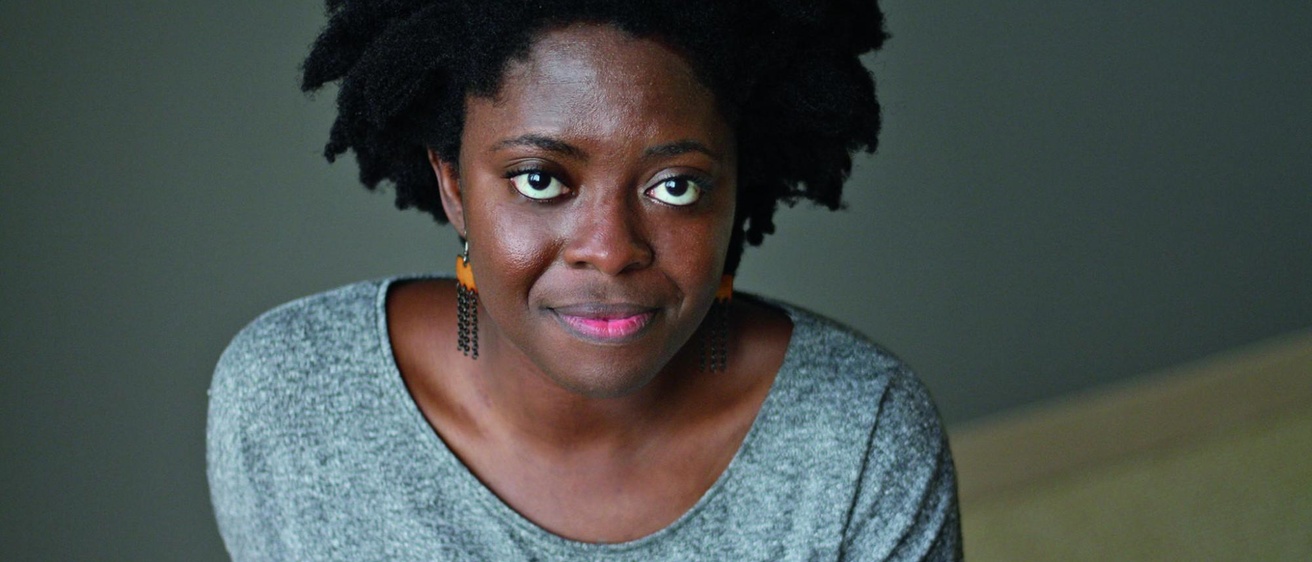In the spring of 2015, Iowa City buzzed with the news that recent Iowa Writers’ Workshop graduate, Yaa Gyasi, 25, who was still living in the area, had sold her debut novel for seven figures. Published one year later, Homegoing has received national acclaim, was listed as a New York Times best-seller, and counts famed author Ta-Nehisi Coates as a vocal admirer.
Gyasi returned to Iowa city in October to give a reading from Homegoing. The novel follows the lives of two Ghanaian sisters and their descendants, tracing the circumstances and effects of the slave trade from a British slave fortress in 18th-century Ghana to modern-day California.
Gyasi spoke with Iowa Now to discuss the impact the Iowa Writers’ Workshop had on her work, as well as her time at the University of Iowa.
What did it mean to gain admission to the Iowa Writers’ Workshop and to study there?
It was hugely important to my career. Before Iowa, I was living in San Francisco and working at a tech startup and totally hating it. And that call from Sam (Lan Samantha Chang, director of the Iowa Writers’ Workshop) really changed the course of my life in many ways, not least of all just because Iowa was a place where I had a chance to really sit down and focus on this novel, Homegoing, which I had been turning around for a while. So I think for me that acceptance meant that I was finally going to get a chance to really sit down and work.
How would you describe the influence of the workshop on Homegoing? How did it help or affect it?
I think it helped in that, again, before Iowa, although I had been working on the novel for about three years, it was so piecemeal because at first I was in school and then I had a job, and I hadn’t really had a long stretch of time before me to really think critically about this novel. And I remember when I got to Iowa, Aamina Ahmad, who had a workshop with me, said to me the first week I was there, “If you have an idea for a novel, this is the time you need to start working on it.” So I thought, “Oh, OK, maybe I should return to that novel.”
Iowa was the first place that I had other eyes on my work in a meaningful, critical way, and also the first place that gave me permission to be the kind of person who spends all day thinking about art.
Who made big impressions on you in the workshop, and what impressions did they leave?
Wells Tower taught this class on writing a novel’s first chapter, and it was very quick and intense. It was the first place I ever showed any of Homegoing. I showed the first chapter in that class, and he was so encouraging that—even though I had already written past the first chapter—it made me feel like I was onto something.
And then Daniel Orozco was my thesis adviser, and he probably went through the first six or seven chapters of Homegoing, so we actually got through quite a few chapters. I met him once a week. And he was just very generous and very available and always came very prepared and had thought deeply about my work.
Ayana Mathis was one of my favorite workshop instructors. And I think when I had her she was on tour for her novel, The Twelve Tribes of Hattie. It had just come out and it was doing so well and yet every Tuesday she showed up full of generosity, having read our work, totally present, and I never forgot that.
Lastly, Sam Chang, she was the first person to read the entire novel all at once and give me feedback on it. And her feedback was really invaluable, she said so many useful things. I’ve talked about her before in interviews because she’s the person who told me all of the chapters were love stories; it was her idea to use a physical object to track through each of the chapters—she just had a lot of really wonderful feedback.
What advice if any would you have for people applying to the workshop or considering coming to Iowa City for the workshop?
If you’re coming to Iowa City for the workshop, I would say this is the time you’re allowed to be the most daring. Give yourself permission to work on whatever it is you’ve been tossing around in your head. Allow yourself the space and the time to devote real care to your work because it gets harder once you leave.
If you’re an aspiring writer and thinking about going to a program, my advice is to just read. Read an incredible amount. Read things beyond what you can do and try to figure out what you like about it and what the writer did to make it that way.
Do you have any advice for other writers hoping to get published or who are in the process?
Yes, I would say don’t show your work to agents and editors and whatnot until you’re finished with it, until you feel satisfied with it. At a place like Iowa where there are agents coming in to see you all the time, it can be tempting to just show someone 30 pages of something and hope that they will change your life. But I think you should give yourself the space and the time and the care to make your work what you want it to be before other forces come in and shape it. And that way, it gives you the advantage of having a clear vision, so that you know when someone isn’t speaking to what you think your work should and could be.
